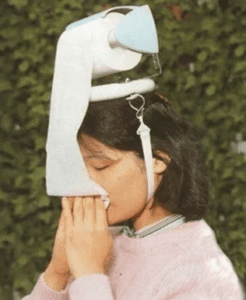Everyone in my house seems to have come down with an alien super virus, causing a rainbow-colored assortment of fluids to appear from various parts of our heads. I’m expecting the Center for Disease Control to knock on my door any day and bring my family in for testing, and then leave the abandoned house covered in a plastic bubble. If you’ve ever seen the movie “Outbreak,” it feels kind of like that.
It’s cold and flu season, so I know I’m not alone. My office is filled with patients sniffling, sneezing, coughing and hacking. Most years I’m able to avoid the winter crud despite being exposed to a constant barrage of nasty organisms, but this year some crafty bug passed through my defenses. So this inspired me to write about what actions you can take (or at least try to take) to avoid getting sick.
 Greatest invention ever?
Greatest invention ever?
As with everything in medicine, nothing works perfectly. But there are a few basic things you can do to at least try to stay healthy this winter, many of which you probably already know.
The healthier you are in general, the healthier your immune system will be, and the less likely you will catch an infection. So, that means getting plenty of sleep, eating a well-balanced diet, and getting regular exercise (sound familiar?). It also means cutting down on alcohol. There’s plenty of evidence to show that alcohol lowers your immune system and puts you at higher risk for infections (despite the prevailing sentiment that drinking alcohol kills germs). This is a big reason why so many colds happen after the holidays.
The single best defense against germs is good hand hygiene. I wash my hands before and after every patient, which comes out to about 30 times/day. Be thorough when you wash your hands; the general rule of thumb is to sing “Happy Birthday” twice while washing to be sure you’ve sent all the bugs down the drain. I also go through so much waterless soap that my staff accuses me of drinking it. It’s a good idea to travel with a bottle of Purell wherever you go. You should also wipe down your keyboards and cell phone with a disinfectant cleanser at least once a day during flu season.
An equally effective method is to avoid or minimize your exposure to these germs in the first place. This doesn’t mean wrap yourself in cling wrap and avoid all human contact for the winter, but it does mean acting as if everything and everyone you touch is infected. You can shake hands, but be sure to wash your hands afterwards (I generally resort to an elbow bump instead of a handshake in the winter). If you touch the escalator railing at the mall, take out the Purell. Keep your hands away from your face, and don’t share cups or utensils, even with your family.
And don’t forget the flu shot! Every Fall, I spend about 40% of my time explaining to patients why the flu shot is important. Tens of thousands of Americans die from the flu every year, and over 200,000 are hospitalized because of it. On average, the flu shot is about 50% effective, which is far better than the zero percent you get from not having the shot. And contrary to popular belief, you CANNOT get the flu from the flu shot. The flu shot saves lives and keeps you healthy, unquestionably. I haven’t missed my shot in over 20 years, and neither should you.
What about supplements? There’s Zinc, Echinacea, Vitamin C, Ginseng, Elderberry, local honey, and many others touted to prevent or cure the common cold. Zinc, Elderberry, and high-dose Vitamin C may shorten the course of a cold, and Ginseng may help in preventing an infection, though the evidence for these claims is based on small or inadequate studies. Sadly, despite years of research, nothing has been shown to clearly work consistently for preventing or treating a cold. Interestingly, Echinacea is the most commonly used supplement for colds, and may be the least likely to actually work. It’s fine to try any or all of these for your sniffles, but temper your expectations, and be sure to get them from a respectable store and U.S. manufacturer (NOT online).
Finally, what can you do if you’ve tried all of the above, and you still feel like you’re in a Nyquil commercial? Unfortunately, rest and time are the only sure-fire solutions for most viruses. Good hydration, a humidifier, and saline nasal spray may help as well. Over-the-counter cold remedies like Pseudoephedrine and Guaifenesin may help your symptoms, but probably won’t shorten the course. Sorry to break the bad news.
If you feel you have the actual flu (i.e. influenza virus), which comes with a high fever, or if you think you might have a bacterial infection instead of a virus, you should contact your doctor, because you might need prescription medication.
In summary, wash your hands, don’t kiss strangers, and treat your body right to prevent getting sick. Just like mom said.
Good luck and good health!
Kenneth Zweig, M.D.
Northern Virginia Family Practice

